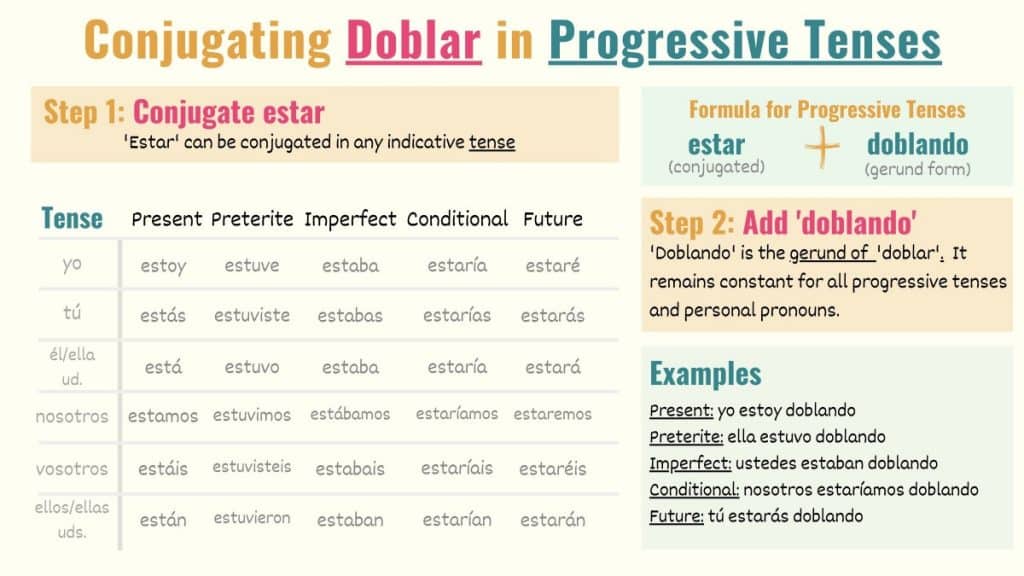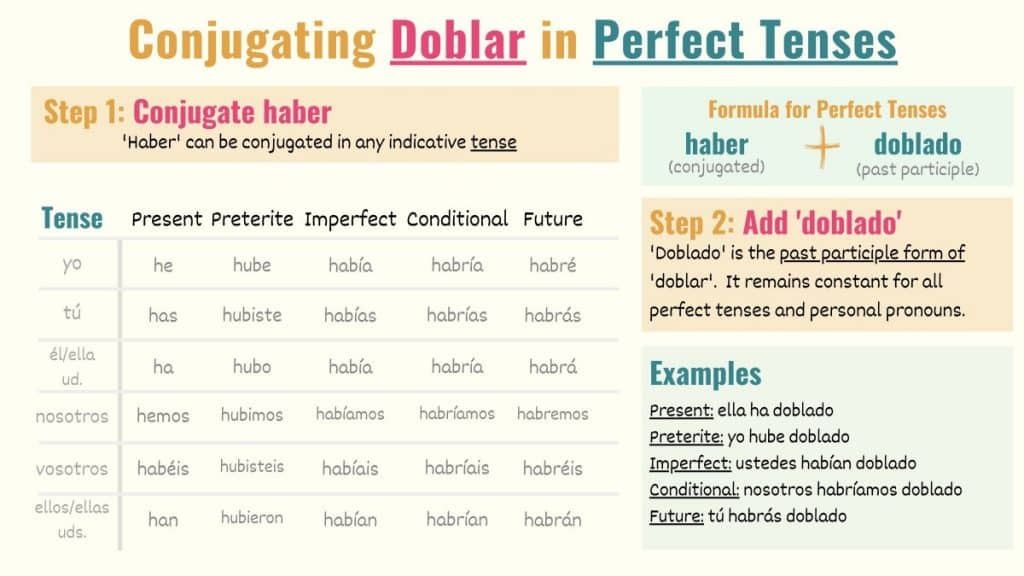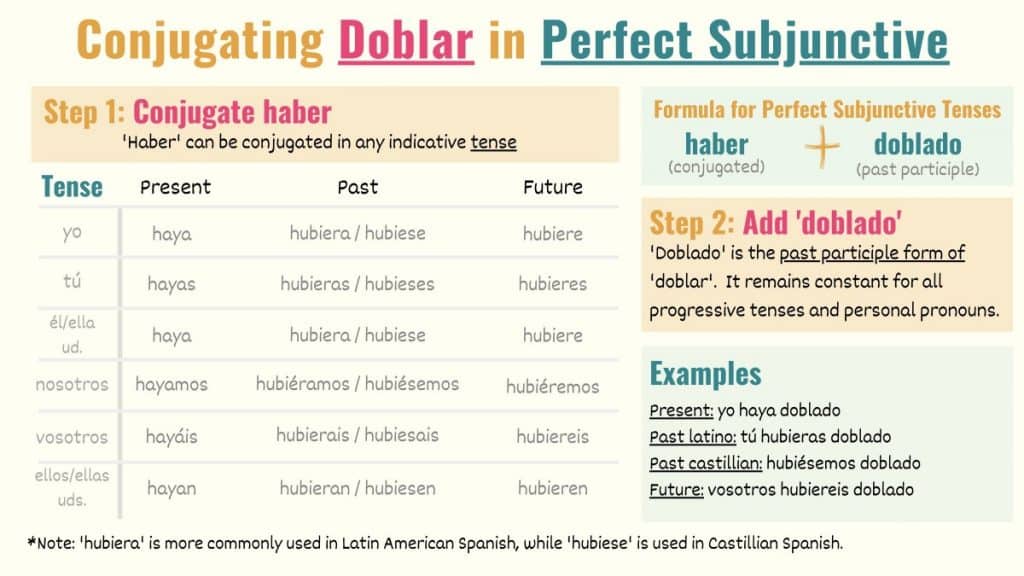In this short guide, we will cover the following topics for ‘doblar’ in Spanish:
- What does ‘doblar’ mean?
- ‘Doblar’ Conjugations
- How to Use ‘Doblar’ in Spanish
- Expressions & Idioms with ‘Doblar’
- Synonyms of ‘Doblar’ in Spanish
What does ‘Doblar’ mean?
Definition – ‘Doblar’ means ‘to fold’, ‘to bend’, ‘to double’ or ‘to dub’. As a result, this verb is used to talk about folding or bending something. In other contexts, it is also used to speak about increasing an amount two times and to talk about dubbing movies or tv shows into another language.
Depending on the situations where it is being applied, ‘doblar’ can have several meanings in Spanish. Below are some of the most common contexts where you can use this verb as well as the English translation for each one of these meanings.
- When talking about bending or folding something, it is translated as ‘to fold’ or ‘to bend’.
- If we refer to doubling something (i.e. something has increased by a factor of 2), ‘doblar’ means ‘to double’ or ‘to double down’.
- In case we are speaking about translating or dubbing into another language, it can be used as ‘to dub’.
‘Doblar’ Conjugations
Conjugating ‘doblar’ in Spanish does not require changes on the stem because it’s a regular verb. This means that for most tenses, you’ll use the stem ‘dobl’. Keep in mind that with certain meanings, you’ll need to use the pronominal form doblarse.
This doesn’t affect the way you conjugate the verb, but it does mean that, depending on what you want to express, you’ll need to include either a reflexive pronoun or an object pronoun.
Indicative
Present tense conjugation
| Person | Conjugation | Translation |
|---|---|---|
| Yo | doblo | I fold |
| Tú | doblas | You fold |
| Él / Ella / Usted | dobla | He/She folds |
| Nosotros | doblamos | We fold |
| Vosotros | dobláis | You fold |
| Ustedes / Ellos / Ellas | doblan | They/You fold |
Preterite tense conjugation
| Person | Conjugation | Translation |
|---|---|---|
| Yo | doblé | I folded |
| Tú | doblaste | You folded |
| Él / Ella / Usted | dobló | He/She folded |
| Nosotros | doblamos | We folded |
| Vosotros | doblasteis | You folded |
| Ustedes / Ellos / Ellas | doblaron | They/You folded |
Imperfect tense conjugation
| Person | Conjugation | Translation |
|---|---|---|
| Yo | doblaba | I folded |
| Tú | doblabas | You folded |
| Él / Ella / Usted | doblaba | He/She folded |
| Nosotros | doblábamos | We folded |
| Vosotros | doblabais | You folded |
| Ustedes / Ellos / Ellas | doblaban | They/You folded |
Future tense conjugation
Notice that the future tense of ‘doblar’ is created by simply attaching the future endings to the end of the verb in the infinitive form.
| Person | Conjugation | Translation |
|---|---|---|
| Yo | doblaré | I will fold |
| Tú | doblarás | You will fold |
| Él / Ella / Usted | doblará | He/She will fold |
| Nosotros | doblaremos | We will fold |
| Vosotros | doblaréis | You will fold |
| Ustedes / Ellos / Ellas | doblarán | They/You will fold |
Conditional tense conjugation
| Person | Conjugation | Translation |
|---|---|---|
| Yo | doblaría | I would fold |
| Tú | doblarías | You would fold |
| Él / Ella / Usted | doblaría | He/She would fold |
| Nosotros | doblaríamos | We would fold |
| Vosotros | doblaríais | You would fold |
| Ustedes / Ellos / Ellas | doblarían | They/You would fold |
Progressive Tenses

Cuando me fui, Jason estaba doblando la ropa.
When I left, Jason was folding the clothes.
Niños, ¿por qué estaban doblando sus juguetes?
Kids, why were you bending your toys?
Perfect Tenses

Lily ha doblado dos películas para niños.
Lily has dubbed two movies for kids.
En unos meses, Joaquín y Julie habían doblado sus ganancias.
In a few months, Joaquin and Julie had doubled their earnings.
Doblar Subjunctive Conjugations
Present subjunctive conjugation
| Person | Conjugation | Translation |
|---|---|---|
| Yo | doble | To fold |
| Tú | dobles | To fold |
| Él / Ella / Usted | doble | To fold |
| Nosotros | doblemos | To fold |
| Vosotros | dobléis | To fold |
| Ustedes / Ellos / Ellas | doblen | To fold |
Imperfect subjunctive conjugations
| Person | Conjugation | Translation |
|---|---|---|
| Yo | doblara / doblase | I folded |
| Tú | doblaras /doblases | You folded |
| Él / Ella / Usted | doblara / doblase | He/She folded |
| Nosotros | dobláramos / doblásemos | We folded |
| Vosotros | doblarais / doblaseis | You folded |
| Ustedes / Ellos / Ellas | doblaran / doblasen | They/You folded |
Perfect subjunctive

Espero que Chloe haya doblado la ropa.
I hope that Chloe folded the clothes.
Imperative
Imperative conjugation
| Person | Conjugation | Translation |
|---|---|---|
| Tú | dobla | Fold |
| Nosotros | doblemos | Let’s fold |
| Vosotros | dobléis | Fold |
| Ustedes | doblen | Fold |
Here are some examples of how to give both negative and affirmative commands with ‘doblar’. Notice that for the negative imperative, you’ll need to use the present subjunctive conjugation.
[‘doblar’ conjugated] + [determiner] + [noun] + [complement]
Dobla tus camisas y colócalas en la gaveta.
Fold your shirts and place them in the drawer.
Cuando terminen, doblen sus exámenes a la mitad.
When you finish, fold your tests in half.
No + [‘doblar’ present subjunctive] + [determiner] + [noun] + [complement]
No dobles la silla, puedes romperla.
Do not bend the chair, you may break it.
Charlie, no dobles en esta calle. Sigue manejando.
Charlie, don’t turn onto this street. Keep driving.
How to Use ‘Doblar’ in Spanish with Examples
There are three ways in which you can use ‘doblar in Spanish:
- To talk about bending or folding something
- To talk about doubling something (by duplicating or multiplying it by two)
- To refer to translations or dubbing into another language
Here are some detailed descriptions that will teach you how to use ‘doblar’ properly in Spanish. I’ve also included some examples and phrase structures that will show you which elements you might need to create your own sentences.
To talk about bending or folding something
‘Doblar’ in Spanish means ‘to fold’, ‘to bend’ or ‘to twist’. So, we can use this verb to express that we’re folding or bending any kind of object. Here are some examples of how to use this verb.
[‘Doblar’ conjugated] + [determiner] + [noun] + [complement]
Doblaron los manteles y los guardaron.
They folded the tablecloths and put them away.
Doblarás la mesa, no coloques cosas muy pesadas.
You will bend the table, do not place heavy things on it.
¿Por qué no han doblado su ropa?
Why haven’t you folded your clothes?
Notice that as a pronominal verb, you can use ‘doblar’ to express that a person bended or twisted some part of their body. To express this meaning, you’ll need to use a reflexive pronoun.
[Reflexive pronoun] + [‘doblar’ conjugated] + [body part]
Me doblé el tobillo hoy en la mañana.
I twisted my ankle this morning.
Sandra y Luisa se doblaron el cuello en el gimnasio.
Sandra en Luisa twisted their necks in the gym.
‘Doblarse’ also expresses that a person gave in to someone else or to a certain circumstance. So, with this meaning, it could be translated as ‘to bend’, ‘to bow down’, ‘to cave’ or ‘to give up’.
[Reflexive pronoun] + [‘doblar’ conjugated] + [complement]
Te doblaste ante la presión de tus colegas.
You caved to peer pressure.
Mi papá se doblegó y me dejó ir a la fiesta.
My dad gave in and let me go to the party.
Take Note: In Spanish, ‘doblar’ can also be used to point out the direction that either a vehicle or a person needs to turn into. Although it can be translated as ‘to turn’, this use of ‘doblar’ is more suitable for formal contexts.
[‘Doblar’ conjugated] + [preposition] + [definite article] + [noun]
Dobla a la izquierda y encontrarás la casa.
Turn left and you will find the house.
Doblaron a la derecha cuando llegaron al cruce.
They turned right when they reached the intersection.
Si doblan en la siguiente cuadra, encontrarán la farmacia.
If you turn on the next block, you’ll find the pharmacy.
Talking about doubling things
Another way to use ‘doblar’ in Spanish is to express that an amount or number has increased two times or it is twice the amount of something else. In this case, ‘doblar’ can be translated as ‘to double’, ‘to duplicate’, ‘twice’ or ‘to double down’.
[Indirect object pronoun] + [‘doblar’ conjugated] + [determiner] + [noun]
Sara le dobla la edad a Angélica.
Sara is twice Angelica’s age.
Doblaron la apuesta y el juego se puso más interesante.
They doubled the bet and the game became more interesting.
Jaime y Juan doblaron sus ganancias en dos meses.
Jaime and Juan double down their earnings in two months.
Referring to translations or dubbing into another language
In the contexts of movies and tv shows, ‘doblar’ expresses that a dialogue is being translated or the audio is dubbed into another language. As a result, in this situation, this verb means ‘to dub’.
[‘Doblar’ conjugated] + [determiner] + [noun] + [complement]
Doblaron la película al español.
The film was dubbed into Spanish.
Humberto Vélez dobló la voz de Homero Simpson.
Humberto Velez dubbed the voice of Homer Simpson.
En una semana, doblaremos esta escena otra vez.
In one week, we’ll dub this scene again.
Take Note: when referring to films or performing arts, ‘doblar’ also expresses that an actor has a substitute who is in charge of filming dangerous or risky scenes.
[‘Doblar’ conjugated] + a + [noun] + [complement]
Doblarán a los actores en las escenas de peligro.
Actors will be doubled in dangerous scenes.
‘Doblar’ Expressions & Idioms
Below there are some idiomatic expressions with ‘doblar’. Since these phrases can help you communicate better, you should try to include them in your vocabulary.
Doblar las manos: This common saying can express that someone gives up or gives in to something. In English we would say ‘to give in’.
Doblar los codos: This expression in Spanish is used when a person needs to study a lot for an exam. It can be translated as ‘to study hard’ or ‘to study a lot’.
Doblar la cerviz: In Spanish, we can use this expression when we want to express that someone surrendered, gave up or is submissive. The translation can be ‘to throw in the towel’.
Synonyms of ‘Doblar’ in Spanish
Duplicar: If we are talking about doubling down an amount, we can use ‘duplicar’ instead of ‘doblar’. This verb is the direct translation of ‘to duplicate’.
Plegar: When speaking about folding a flexible object, this verb can substitute ‘doblar’. It can be translated as ‘to fold’.
Dar vuelta: In Spanish, ‘dar vuelta’ is used to talk about turning into a certain direction. As a result, when using this meaning, you can use ‘dar vuelta’ instead of ‘doblar’. This verb means ‘to turn’ or ‘to make a turn’.
Torcerse: This verb can replace ‘doblar’ when talking about bending or twisting a body part. ‘Torcerse’ means ‘to twist’ or ‘to bend’.



